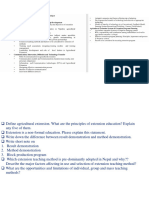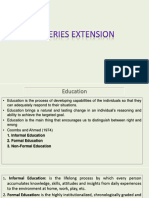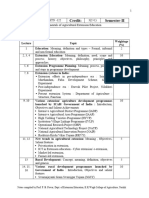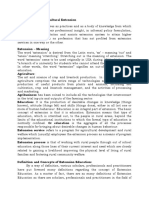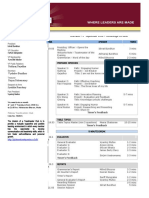0% found this document useful (0 votes)
11 views36 pagesAgriculture Extension
The document discusses the concept of agriculture extension education, highlighting its definitions, types (formal, informal, and non-formal), and principles. It emphasizes the importance of communication in teaching and learning processes, detailing various communication models. Additionally, it outlines the objectives and roles of extension education in promoting desirable changes in behavior and enhancing agricultural practices.
Uploaded by
dde450951Copyright
© © All Rights Reserved
We take content rights seriously. If you suspect this is your content, claim it here.
Available Formats
Download as PDF, TXT or read online on Scribd
0% found this document useful (0 votes)
11 views36 pagesAgriculture Extension
The document discusses the concept of agriculture extension education, highlighting its definitions, types (formal, informal, and non-formal), and principles. It emphasizes the importance of communication in teaching and learning processes, detailing various communication models. Additionally, it outlines the objectives and roles of extension education in promoting desirable changes in behavior and enhancing agricultural practices.
Uploaded by
dde450951Copyright
© © All Rights Reserved
We take content rights seriously. If you suspect this is your content, claim it here.
Available Formats
Download as PDF, TXT or read online on Scribd
/ 36





